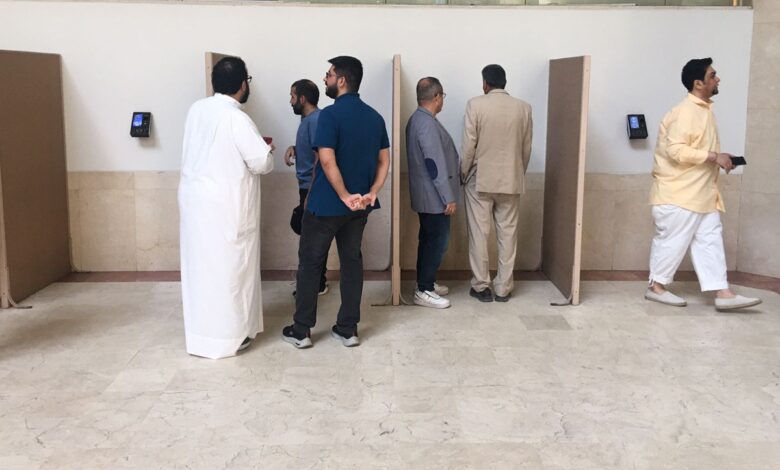Initial third fingerprint test sees crowding, some bypass rules
During the initial test of the new third fingerprint attendance system in government agencies, some employees are ‘circumventing’ the system by clocking in on time but not adhering to full attendance.

-
Commitment to the fingerprint system varied on its first day, though most agencies announced their intent to implement it for verifying attendance.
-
Employees with permission or sign-out during the 60-minute window are exempt from fingerprinting; otherwise, they are marked absent without permission.
-
Failure to provide three fingerprints will be reviewed starting with the September salary payments, and agencies may receive a warning.
During the initial test of the new third fingerprint attendance system in government agencies, the public headquarters experienced unprecedented crowding, indicating strong adherence to the new policy, according to regulatory authorities. However, some sources have reported that commitment may still be lacking, as some employees are ‘circumventing’ the system by clocking in on time but not adhering to full attendance, as noted by Al Jarida newspaper.
On its first day, the level of commitment to the fingerprint attendance system varied across ministries, although most government agencies announced their intention to implement the system and its purpose for verifying attendance.
Employees at the University and Applied University adhered to the ‘flexible fingerprint’ policy, and there was no crowding at the devices. In this context, Ministry of Education employees began using the fingerprint system two hours after the start of their workday.
The process of verifying presence through fingerprint devices placed throughout the ministry’s corridors went smoothly, without any obstacles or crowding.
Educational sources revealed to Al Jarida newspaper that the ministry is considering the possibility of installing fingerprint devices at locations outside the ministry’s office for engineers and employees assigned to external work. This measure aims to facilitate attendance verification, particularly for those whose duties require them to be outside the ministry building.
The sources noted that the ministry is developing a special mechanism for employees who need to work outside the office, such as maintenance and facilities engineers, computer engineers, and others assigned to external tasks. It is anticipated that fingerprint devices will be set up in schools or educational areas close to their external workplaces.
Sources added that the ministry’s installation of multiple fingerprint devices on each floor of its office has facilitated the implementation of the attendance system, with employees adhering to it without any issues.
There was no recorded congestion at the devices, and it takes no more than two to three minutes for an employee to register their presence. The devices are placed in four locations on each floor, as well as at the ministry’s various entrances and in the parking areas.
Crowded buildings!
As for the Ministries of Public Works and Electricity and Water, employees complied with the administrative decision requiring them to prove attendance with a third fingerprint. The buildings of the two ministries were crowded around nine o’clock in the morning with employees waiting to use the fingerprint devices to register their presence, two hours after the initial attendance fingerprint.
Employees were present in large numbers, and departments that had been vacant in recent days and months were revitalized, with employees back at their desks. There was considerable discussion about the ‘half-time fingerprint’ within the ministries and their corridors, as it mandated that everyone be present. For the first time in years, external parking lots were filled with the cars of employees from both ministries.
Al Jarida newspaper visited the two ministries, where employees were seen on all floors observing the new procedure of the third fingerprint taken two hours after the initial attendance fingerprint. The Ministry of Education also adhered to the new attendance fingerprint system, with smooth implementation of the decision.
Flexible fingerprint check within 60 minutes of two-hour mark
Within the Ministry of Public Works, an administrative circular signed by Dr. Noura Al-Mashaan has been issued. It states that all employees of the Ministry and the Public Authority for Roads and Land Transport must prove their presence at the workplace during official working hours by conducting a flexible fingerprint check within 60 minutes after the initial two hours from the start of official working hours.
The circular notes, “Employees are not required to use this fingerprint if they have obtained permission or signed out during the 60-minute period. An employee who fails to prove their presence within this timeframe will be considered absent without permission. The period from the end of the initial two hours until the fingerprint check will be counted as monthly delay periods in accordance with Article 18 of Civil Service Council Resolution No. 41 of 2006.”
The circular also specifies that the flexible fingerprint check must be completed by entering the fingerprint screen (‘enter’) during working hours. For employees working shifts, the fingerprint check should occur either two hours after the start of their shift or two hours before the end of their shift, depending on their schedule. This decision was effective from Sunday.
University and Applied University employees start third flexible fingerprint check
On the first working day following the new circular, employees of the university and the Public Authority for Applied Education and Training began adhering to the third flexible fingerprint decision. This required them to use a flexible fingerprint check two hours after the initial entry fingerprint and within 60 minutes of it. Both the University and the Applied University complied with the Civil Service Bureau’s directive regarding the implementation of this third fingerprint. Fingerprint locations varied across different sites.
At Kuwait University and the Applied University, fingerprint devices were placed in various administrative departments and at the main gate of the building. In schools and educational districts, fingerprint devices were set up for engineers and other staff assigned to external work.
Despite varying employee attendance, there was no congestion at the fingerprint devices, as they were distributed across departments. All devices accepted fingerprints as long as employees were within the building. The timing for the third fingerprint check varied, with some employees completing it early and others at mid or end of the time slot, without any noticeable issues.
Fingerprint system for school staff by September 8
Al Jarida newspaper has learned from its sources that the Ministry of Education is set to implement the presence fingerprint system for educational and administrative staff in government schools. The relevant authorities are currently adjusting the devices to ensure they are ready to record fingerprints when school staff returns to work on September 8.
Missing three fingerprints will lead to salary review
A source in the Civil Service Bureau stated that the bureau is monitoring the implementation of the “third” flexible fingerprint system, as outlined in the circular issued last week, which began today in government agencies.
The source explained to Al-Jarida newspaper that each agency is responsible for ensuring its employees prove their attendance three times a day according to designated times for attendance and departure. Failure to provide three fingerprints will be reviewed starting with the September salary payments, and agencies may receive a warning.
Employees who do not comply may face future deductions, as linked to the bureau’s monitoring mechanism. The flexible fingerprint system aims to reduce absenteeism and ensure employees remain at work during official hours.
Neglecting attendance requirements
While the state aims to enforce work discipline and ensure productivity through its recent measures mandating electronic presence fingerprints across all departments, some employees continue to neglect attendance requirements.
Despite the implementation of these measures, which are intended to deter employees from leaving their workplaces without supervision, the system has not been fully effective. Issues such as congestion and ineffective adherence to the fingerprinting process have emerged.
It appears that the Civil Service Bureau and government agencies may need to consider alternative solutions, such as granting direct managers the authority to address employees who rely on the fingerprint system while neglecting their duties or improperly recording their presence and departure.
Employees on official tasks exempt from fingerprinting
Matrouk Al-Mutairi, the Undersecretary of the Administrative Sector at the Ministry of Education, asked the ministry’s sectors to review all official missions and plans assigned to employees to determine if they should be exempt from the attendance fingerprint.
Al-Mutairi, in letters addressed to the sector undersecretaries and obtained by Al-Jarida newspaper, stated that, based on a letter from Mansour Al-Daihani, the Acting Undersecretary of the ministry, all official missions and work plans for employees must be scanned and entered into the ‘Mail and Correspondence System’ program.
This will enable the competent authorities to exempt these employees from the attendance fingerprint during the mission or plan period.













